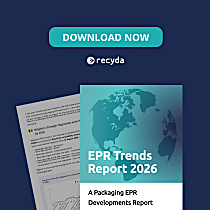Plastic Overshoot Day: Annual global waste production set to outpace management by 69.5 million tons

05 Sep 2024 --- Today is the annual Plastic Overshoot Day, led by Swiss environmental consultancy and research organization Earth Action, which marks the point in the year when global plastic waste surpasses the world’s waste management capacity. This year 220 million tons of plastic waste is set to be generated.
On average, 28 kg of plastic waste per person will be created worldwide, with a 7.11% rise in total plastic waste since 2021. One-third of all waste will be mismanaged at the end of its life, amounting to 69.5 million tons of plastic left in the natural environment.
The Plastic Overshoot Day report from Earth Action also highlights that 66% of the global population now lives in areas where plastic waste has already exceeded local waste management capacity.

Despite improvements in plastic waste management capacity, the overall quantity of mismanaged waste remains unchanged due to increasing production. Earth Action emphasizes that these findings show thatthe assumption that recycling will “solve the plastics crisis” is flawed.
Sarah Perreard, co-CEO at Earth Action & Plastic Footprint Network, says: “The necessity for change is founded in the need to protect the environment and our health, but the risk of inaction to business is often overlooked — profit as well as the planet will be a victim of this crisis.”
“Many corporations and SMEs are taking steps to account for their plastic footprint and instill circularity through supply chains. It is this corporate action, collaboration and regulation through an effective UN Treaty that will deliver change. I hope 2024 is the year we see ambition turned to action.”
UN Global Plastic Treaty
Each country contributes to a portion of this plastic overshoot, according to the total amount of plastic waste they mismanage. Just 12 countries are responsible for 60% of the world’s mismanaged plastic waste, the top five being China, Russia, India, Brazil and Mexico.
 Production is outpacing management systems development.Countries have been categorized into six different “archetypes” based on the quantity of waste produced, how this waste is domestically managed and import and export rates.
Production is outpacing management systems development.Countries have been categorized into six different “archetypes” based on the quantity of waste produced, how this waste is domestically managed and import and export rates.
Some countries fit into several archetypes.
They are: Moderate polluters, who generate medium levels of waste, which is usually mismanaged or exported; the Overloaders, who export a significant amount of waste; the Transactors, which have well-managed systems including both import and export (usually wealthy European states); the Low-Waste-Producing polluters, which have poor management systems despite low levels of waste production; finally the Toxic Waste Producers, who generate high levels of waste and usually export and mismanage.
While last year’s Plastic Overshoot Day report analyzed plastic packaging waste alone, this year’s includes plastic waste from the textile industry and household waste in its analysis.
There are 117 days of plastic overshoot, meaning that the plastic waste produced from September 5th until the end of this year will “not be well managed.”
Nicolas Rochat, founder of Mover Plastic Free Sportswear, says, “Today is a stark reminder that the time for change is now. The numbers are clear—three-quarters of the way through the year, we have already exhausted our ability to hold back the plastic tide. Continuing down this path of uninhibited plastic production is unconscionable and threatens the prosperity of both businesses and humankind.”
“So-called solutions such as recycling plastics will only increase the physical and chemical plastic pollution. It’s time to move beyond temporary fixes and invest in innovative, non-polluting alternatives across supply chains that will future-proof us against impending catastrophe. Our planet can no longer afford the cost of inaction nor the cost of perpetuating the problem.”
Earth Action at the INC-5
Earth Action will be attending the final round of UN negotiations in November (INC-5) in South Korea, working alongside delegates, corporations and aligned NGOs.
Earth Action works with international businesses, governments and SMEs to assess the impact of plastics through their supply chains and give advice on transitioning toward circular business models. It is also the founder of the Plastic Footprint Network, a collection of over 35 global organizations including Decathalon, WWF, Mars and Breitling.
The group says it works to establish harmonized, science-based frameworks and strategies for plastic pollution assessment, target setting, and mitigation action. Other network efforts include advocating for meaningful global solutions, including a “robust” UN Treaty.
Recently, the US government reportedly made a U-turn on its stance toward the Treaty and is planning to back the “High Ambition Coalition,” which is pushing for global production caps.
By Louis Gore-Langton











